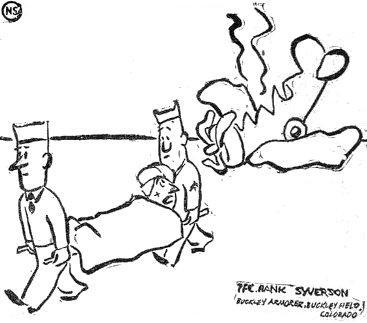
Vol. 1, No. 17 Published by India China Division, Air Transport Command May 10, 1945

|
CALMLY, AFTER WAITING
10 DAYS FOR WAR FLASH
But Realize That Large War Job Remains
To Be Done in the Pacific Area
"This is it," a GI said in ICD headquarters.
"I'm glad it's come," a message center clerk in Delhi said.
"Well, it's over," said a line mech at Kunming.
That, for the most part, is the way ICD officers and enlisted men received the news of unconditional surrender of Germany.
There was little jubilation even when first radio reports came in late Monday night and when newspaper headlines screamed the news Tuesday morning. People had known it was coming, had been waiting ten days for it.
The official announcement of surrender and acceptance by the Allies on Wednesday caused scarcely a ripple at headquarters. Men took the news calmly, almost apathetically, exchanged a few words about it - and went back to work.
Their chief interest was speculation upon how quickly Allied military might could be concentrated against Japan; upon how quickly the War Department's announced demobilization plan could be put into effect, and what effect it would have upon ICD.
War Still To Be Fought
On every hand, there was the realization that a bitter war still had to be fought against Japan, that ICD now would face much heavier responsibilities in prosecuting the final drive against the Jap, and that the men still have a tremendous job to do.
The surrender took place in Rheims, France in the red brick industrial college serving as Gen. Eisenhower's headquarters. A communique said the surrender came at 1:41 a.m. (central European time) May 7, but the terms became effective at one minute past midnight of Tuesday, May 8.
Allied negotiations were handled by Lt. Gen. Walter Bidell Smith, Gen. Eisenhower's chief of staff. The supreme commander did not see German delegate until the ceremony was completed. Gen. Gustav Jodl, new German chief of staff, signed for his defeated nation. Representatives of Russia and France also were present at the session.
Sigh of Relief
There was a long lapse between first reports of the surrender and final confirmation from the White House and Allied capitals. Official announcements were made by President Truman, who asserted the victory is "half won" and Prime Minister Winston Churchill, who predicted retribution for Japan. V-E Day messages also came from Generalissimo Chiang kai-shek and King George, of England.
To ICD the news brought a sigh of relief, a silent prayer of thanks for the fact that no more blood of friends and relatives will have to be spilled in Europe. Men here realized, however, that the final phase of their war only now really will get underway.
Typical of the GI attitude were comments of men at various ICD bases. Said S/Sgt. Joseph V. Powers, 27, San Antonio, Tex., of the Hq I & S section:
"Coming as it did, the end in Europe wasn't much of a surprise to anyone. While we are all happy, beyond words, to hear of the surrender, it really is just a signal for the start of the second and final round."
Cpl. Edwin A. Anderson, 33, of the Bronx, who works in the Hq personnel section, summed up his sentiments with, "It surely was good to hear about V-E Day. I'm really glad those boys over there will get a rest. They haven't been having a picnic."
Like a Dream
At New Delhi, the reaction ran about the same. Sgt. Alfred J. Leone, 23, of Middletown, N.Y., clerk in the AG section at 1302, was not particularly jubilant. He said he might have been, had the surrender come six months ago. He believed V-E may help the replacement situation and enable ICD men to get home at the end of their 24 months. He's been in India 22 months now.
"Like a dream coming true for the whole world," was the way Sgt. Roland R. Foster, 24, of West Springfield, Mass., out it. Foster, an instrument specialist at 1307 with 20 months overseas behind him, thought he was too young to get out of the Army soon but guessed the Japs would be beaten by the end of 1946.
Cpl. John J. Gannon, 36, of Hamburg, N.Y., 1307 navigation and briefing clerk asserted:
"Well, I'm damn glad like everybody else, but until the Japs say the same thing we're no better off. There'll be another year of actual fighting before this is finished."
V Day Brings Messages from ATC Generals
Statements Issued by Both Lt. Gen. George and Brig. Gen. Tunner
Hq., Calcutta - The cessation of hostilities in Europe brought messages from Lt. Gen. Harold L. George, CG of ATC, and Brig. Gen. Tunner, CG of ICD. Gen. George wrote:
"This is a great day for commemoration: half of the job, and the bigger half, is well on the way to completion. The German, who two years ago threatened the security of the world, has been defeated, defeated in such decisive fashion that future generations of Germans will be reluctant to turn to plans of destruction and world conquest.
'Another Job'
"You, as a member of the ATC, have contributed substantially to the military success which we now commemorate. The ATC has taken troops to their overseas stations; we have supplied and sustained them; we have been their method of communication with the home folks through the transportation of mail; we have taken plasma and medical supplies to them on the other side and have returned the soldiers to the hospitals of the United States.
"Now another job comes up - to move the men and the material to a new scene of action - to defeat the Jap in his homeland. In this job the experience which you have gained in the past several years will aid in more effective accomplishment. The miles of ocean on the Pacific side will be bridged with the airplanes of ATC, taking again to war the men and material with which the German was defeated.
"We are proud of what you have done. With the first part of the job now in hand, we can concentrate upon the accomplishment of the second. Give it your best and we will look forward to the day when the flag of the Rising Sun will be lowered in unconditional surrender and our armed forces will have made an outstandingly major contribution to winning the two greatest wars in the history of the world."
Brig. Gen. Tunner asserted:
"On Dec. 11, 1941, Nazi Germany declared war on the United States. Today, more than three years later, Germany has at last surrendered - hammered into final and crushing defeat by the combined power of Allied forces. The pride which we all feel in this great victory is sobered only by the remembrance of its cost: the men, the machines and the money which this war for humanity has taken.
'One of Biggest Jobs'
"These long years of preparation and attack have taught us how staggering is the task of overwhelming a modern enemy like the Nazi or the Japanese. We have learned that there is no quick, no easy, road to victory.
"Such are the thoughts which must come at this moment to every American who fights, or flies, or works in the battle against the Jap. For although we know that the entire might of the Allies can now be concentrated against our last enemy, we know too that these preparations and these advances cannot be a thing of tomorrow, or the day after. They will take time, and labor, and lives.
"Of particular significance to the officers and men of ICD is the great and difficult task which now becomes their assigned responsibility. For there remain today only two major approaches to the destruction of Japanese armies and Japanese might. One is through the waters of the Pacific and the other through the efforts of ICD. In short, our command must perform one of the biggest jobs left in this war.
"Germany has gone down to defeat, but Japan has not. In her home islands and on the Chinese mainland, Japan stands a powerful foe - with much of her strength still intact. It is certain, of course, that she will be fully and finally beaten. Of that there is not the slightest doubt. It is equally certain, however, that there lies ahead for us all a long, tough road - to Tokyo, victory, and home."
Two ICD Men Released From Jap Imprisonment
By S/Sgt. C. A. Zellinger
Hq., Calcutta - In a Calcutta hospital two ICD fliers, along with some 60 other American airmen, are recuperating from 15 months of Japanese internment as a 60-mile march to freedom.
Forced to bail out over the Hump, Lt. Robert R. Bagby (ASN 0739648) of 750-C, Y Ave., Casper, Wyo., and Cpl. Curtis Pritchard (ASN 37232257) Roscoe, Mo., were captured and sent to Jap concentration camps at Maneo and Rangoon, Burma.
The story of humiliation and Japanese brutality - the first such story told by an ICD airman - came ro a close April 29 when the men were abandoned by their guards in the face of the advancing 14th Army, after a forced march from Rangoon to Pegu.
Asked Many Questions
The next day a scout contacted the Indian troops who took the freed men to a 14th Army camp.
Now in the hospital, faces that for so long reflected nothing but resentment for the Japanese, are once more brightened by the thoughts of free men.
The men ask innumberable questions - about their folks back home, about fellow crew members, about friends and their organizations.
Lt. Bagby, who bailed from a C-46 knowing that his wife was to have a baby, anxiously awaits word from home. Cpl. Pritchard is concerned about his father who was ill at the time he went down.
Interrogated by Japs
Until the two ATC men met at Myitkyina, the stories of their internment differ. Pritchard, a crew chief, bailed from his ship on Jan. 31, 1944. Seeing another parachute spiralling earthward a short distance from him, he followed a stream in the direction of the 'chute. Unknowingly he walked past a Jap outpost near which he encountered what he thought were friendly Burmese citizens. They led him directly to the Jap outpost.
The Japs took him to an encampment where he was interrogated. Insisting that Pritchard was a radio operator, they became infuriated when he told them nothing about American radio equipment. Later they made him carry luggage, ridiculing him before Burmese and other citizens. This continued until they reached a city, presumably Myitkyina.
There he was joined by Lt. Bagby whose story starts on Feb. 16, 1944, when ne bailed out over the Chin Hills. He landed without injury and began to look for other crew members. he came upon Cpl. Charles W. Linthicum, Little Rock, Ark., suspended from a tree that towered nearly 100 feet into the air. Its trunk was too large to allow climbing. bagby talked the frightened airman into moving over to a smaller tree where he began a difficult descent. Suddenly Linthicum lost his grip and fell the rest of the way. Injured to an extent that he could not move, he was treated for shock and made comfortable by Bagby.
Fired One Shot
Then Bagby started his search for help. Coming upon a stream he followed it, thinking that any inhabitants would live near water. Several days later he found a deserted village where he spotted a British canteen and cigaret cartons labeled "Cycle." Thinking them a British brand, he felt comparitively safe. Walking along a large road he came face to face with a Japanese patrol. He managed to fire one shot at the Japs before they rushed him and threw him on his back.
At the encampment to which he was taken the treatment similar to that administered to Pritchard was re-enacted. After the Japs decided that any attempt to gain useful knowledge from Bagby was futile, they threw him aboard a truck which dumped him into the dingy prison with Pritchard.
Walked on Each Other
As the Japs were pushed south they took their prisoners with them. At Myitkyina the captives were subjected to the constant pounding of the Allies against the stronghold.
Later they were removed to Maneo where they were forced to dig slit trenches and carry sand bags weighing up to 250 pounds. At night they slept on hard floors with burlap bags for beds. For clothing, Pritchard was allowed a "G" string. Bagby, permitted to keep his flying clothes, was the best dressed man in the prison.
Quarters were so close, men walked on each other. Vitamin deficiency caused them to break out in sores and boils. Wounds from shackling, beating, and jungle marching refused to heal. The only medical treatment was administered by a captured Indian doctor. Pritchard's right arm had been injured and became paralyzed. The Indian doctor, through watchful treatment, brought life back into the limb.
Burned Records
Every morning and night all prisoners were forced to attend reveille and retreat formations which the Japs called "tinko." At one time the men were marched over cinders and jungle in their bare feet which still bear testimony to the Japs' unrelenting treatment.
Rations consisted mainly of rice and water. Pritchard received a pint of rice and a pint of water per day. Those who were able to live through the mal-treatment lost from 40 to 50 pounds.
First steps in the evntual spectacular release occurred on the morning of April 24 when the captives saw prison officials burning what appeared to be records. Stockpiles of food and clothing which once had been closely watched, were now available to everyone. The prisoners were herded into the prison yard and told they were to be marched to another prison. Leading the column was the Japanese commandant of the prison. Fifty guards were scattered through the long columns.
Shoeless and already nearly exhausted, they marched all night with one man helping the other to stay in the lines. The next day's march brought them within five miles of Pegu.
Had to Shift for Selves
On April 27 they were spotted by Allied planes. The pilots, thinking them Japs, came in at tree top level and strafed them.
The next morning, ranking Allied officers planned to overcome the guards and effecta wholesale escape. They were set free before they had a chance to test their courage.
Shortly after the guards marched off to the south, Allied fighters strafed a basha in which officers were holding a conference. The senoir British officer of the group was fatally wounded by a 20mm shell.
After putting up for the night an American sergeant volunteered to reconnoiter. "Hell, sir," he said, "somebody has to investigate." He walked two miles and contacted the Indian troops who took them in trucks to a 14th Army camp. After the best of care was given them they were flown to Calcutta, where they are recuperaring.
WD Redeployment Won't Affect Division Personnel
Hq., Calcutta - V-E Day and the War Department's manpower redeployment program reported in Washington will have no immediate effect upon severance from service of ICD personnel, a statement issued by the A-1 section said today.
"The plan announced by the War Department obviously is not a matter which can be done today, or tomorrow," the statement said. "The deployment of millions of men will require time for co-ordination and transportation regardless of how fast all of us would like to see it done. Further, the rapidity with which the program can be got underway will vary in different theaters owing to the different tactical situation existing therein." The statement continued:
"It must not be forgotten for one moment that a bitter war is going on in the Southwest Pacific and that ICD is steadily expanding in personnel at this time to meet the great responsibilities it will share in the final drive against Japan."
It also was pointed out by the A-1 section that ICD personnel do not fall under the jurisdiction of the India-Burma Theater demobilization "point" system for severance from the service, as ICD is directly under the Jurisdiction of the ATC and the War Department in Washington, D.C.
No official details of the "point" system or demobilization procedure, under which ICD personnel will be severed from the service and which will be announced by the ATC in Washington, has been received by ICD. A system following procedures set forth by the War Department is anticipated from ATC and there is no reason whatsoever to believe that ICD personnel will be treated differently than personnel of any other division of the ATC in demobilization under the point system, it was said.
An Army News Service bulletin states that two million men are to be returned to civilian life from the Army during the next 12 months. This is to include soldiers serving in the Pacific as well as those now engaged in the European war. A preliminary survey made on the basis of one-sixth demobilization of the Army indicates that all but two percent of men to be released are those who have served overseas.
About half of the 1,300,000 who will be eligible for release because of extended and arduous service are now in Europe and about one third are in the Pacific. Most of the others are now in the States after having served tours of duty overseas.
|
Over Victory News, But Take
No Time Off for Celebration
To Make Announcement
1340 BU, Kunming - On a bulletin board in Kunming Monday night there had been a simple sign which read, "Not yet!" GIs that evening went to work or back to the barracks predicting, "It won't last much longer."
By 11 p.m. (China time) fragmentary reports drifted in and mechanics on the line greeted each other hopefully, saying "I hear the war in Europe is over, but as yet it hasn't been confirmed." Many went to bed expecting to be awakened for an official announcement.
Awakened the Base
Then at 1:10 a.m. a teletype rattled to life and spelled out the long awaited message. Down at special service two men, Lt. Sidney Walkenstein and Pfc. Clarence Hoffman, had an amplifying system all ready. They were given the go-ahead and Hoffman, half up to his knees in mud, fumbled with the electrical connection between the trailer-borne generator and the amplifier mounted on a jeep. Then they blasted the news throughout the widely dispersed airfield.
In operations as the broadcasting system bounded by, a young flying officer looked at another flyer and mused, "Hell, I'd get drunk tonight if I were a drinking man or had the time."
At the transient mess, the thoughts of 1st Lt. Roy G. Kaye, a co-pilot, turned to home: "I wish I were where my wife is."
A Good Start
Cpl. Robert Messitt, radio operator, was just "Glad."
Capt. Albert C. Newby, pilot, considered the European surrender "A start to a good finish."
Just in from flight, F/O Delmer W. Cesida, co-pliot, said, "It brings me one step closer to seeing my twins."
But in China, next door to the final phase of the war, the trend of thought was, "The boys got that one down, now let's get this one finished."
A pilot and crew heard the news and in a few minutes were roaring down the runway for a test hop. Coolies off-loading a C-54's wet cargo, shouted a "Ding How" to passing soldiers but kept right on rolling gasoline drums onto the truck.
Too Busy to Celebrate
There was a momentary burst of jubilance when word first came over the wires, but then everyone set back to work . . . to help get the job closest to them finished, to aid in the final forced capitulation of Japan.
As linemen went on with their work they speculated on how the European war's end would affect them. Mostly they figured their job would become greater, the overall effort of immense proportions.
Early the next morning GIs were eating and discussing rotation, furloughs, and the wife and kids back home. There had been no celebration and there wasn't going to be one. They were too busy.
Surrender Terms Revealed in Text Signed by Nazis
SHAEF (Paris) - The following is the text of the military surrender by the German Army.
First, we the undersigned, acting by the authority of the German High Command hereby surrender unconditionally to the supreme command of the Allied Expeditionary force and simultaneously to the Soviet High Command all forces on land, sea, and in the air, who are at this date under German control.
Secondly, the German High Command will at once issue orders to all German military, naval and air authorities and to all forces under German control to cease active operations at 11:01 p.m. (central European time) on May 8 and to remain in positions occupied at that time. No ship, vessel or aircraft is to be scuttled or any damage done to their hull, machinery or equipment.
Thirdly, the German High Command will at once issue orders to appropriate commanders and insure the carrying out of any further orders issued by the supreme commander, Allied Expeditionary force, and by the Soviet High Command.
Fourthly, this act of military surrender is without prejudice to and will be superseded by any general instrument of surrender imposed by or on behalf of the United Nations and applicable to Germany and German armed forces as a whole.
Fifthly, in the event of any of the forces under their control failing to act in accordance with this act of surrender, the supreme commander, Allied Expeditionary force and the Soviet High Command, will take such punitive or other action as they deem appropriate.
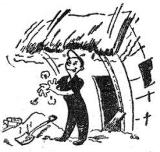 A Huff and Puff and the House of Mistretta Tumbles
A Huff and Puff and the House of Mistretta Tumbles
1305 BU, Calcutta - If rough luck comes in groups of three, the House of Mistretta, home of Teke Hai college, is due for another calamity.
No sooner had the building begun to take definite shape than a high wind leveled it. Persistent labor rebuilt it in short order.
Then came the rains, and though they were a mere sprinkle, the roof sagged and quivered and then the entire edifice came down in a heap.
1st Lt. Thomas A. Mistretta, of Jamestown, N.Y., first president of Teke Hai, for whom House of Mistretta is named, remembers the houses of the Three Little Pigs and wonders whether, like the third pig, the builders of the third House of Mistretta will have better luck than their predecessors have had.
Skillful Wheels-Up Landing Wins 1333 Pilot Official Praise
1333 BU, Assam - An emergency landing successfully executed by Lt. Herman Furman here has resulted in an official commendation from the CO, Col. Charlie F. Skannal.
Lt. Furman was cited for meritorious achievement in bringing his plane in wheels-up after the left gear had buckled on a previous landing attempt.
In commenting on the incident, Col. Skannal wrote:
"You are hereby highly commended. Through your outstanding airmanship, you displayed sound judgement, devotion to duty and high courage. Your accomplishment in the face of great danger demanded exceptional piloting ability, co-ordination and intrepidity. Your excellent technique enabled you to effect a successful landing with a minimum of damage to the aircraft."
|
Crashing P-38 To Save Lives
In 1309 Passenger Terminal
Pilot Unhurt as Landing Gear Collapses, Causes Crash
1309 BU, Bangalore - Serious injury to 60 persons was averted here last week when a test pilot crash-landing a P-38 swerved his plane away from the passenger terminal to explode into the side of a parked C-46.
The pilot, Lt. Vern L. Flanders, stepped from the wreckage without a scratch, though his fighter plane was completely demolished, and the cargo ship bent into a ragged U-shape. Several coolies, loading the C-46 at the time, were slightly hurt and received treatment at the local first aid dispensary.
Passengers from two flights were on the ground
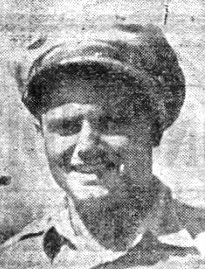
|
In a split second, before the travelers could even run for cover, the P-38 came to a dramatic stop, as it crashed headlong into a side of the C-46.
Lt. Flanders is one of the four pilots from a fighter dquadron sent here to test hop P-38s after modification is accomplished in the Hindustani aircraft factory. A military investigation committee attributed the accident to mechanical causes and cleared military personnel of all liability.
Flying Padre Goes to Agra Every Sunday
Missionary Travels Via ATC for Weekly Services
1303 BU, Agra - When this base was left without a commissioned chaplain, the Rev. William J. Hussey, S.J., a veteran of 15 years of missionary work in India, volunteered to fill the gap.
For the past year the padre has spent every one of his weekends at this base. Each Friday evening he would put away his books, roll up his bedding, and take the night train to Agra. Sunday night he would be off again on the return trip to Jaipur and his classes in a newly established school for boys. Since taking over the assignment, Father Hussey has traveled more than 8,500 miles by train, at his own expense.
Basha Breeze Sessions
Recently ATC came to the rescue. Now, each Friday the boys who fly the Beacon ship stop in at Jaipur to pick up the padre and fly him to Agra in 50 minutes.
Father Hussey doesn't limit his activities here to religious services. He is always happy to meet Americans and at the same time can learn about life in the U.S., and especially Cleveland, from men who only recently left Uncle Sugar. His interesting background provides many old fashion basha breeze sessions.
At one of the sessions he told of the Americans' effect on his little school in Jaipur.
The school is attended by Indian youths who have the blood of ancient Rajiput warriors in their veins. Each day they fight bloodless battles over the identification of passing aircraft. They can spot C-47s, 46s and B-29s at great distances. They talk about two and four engine aircraft with the assurance and certainty of American youngsters their age.
Beacon Ship Exciting
Of all the planes they see there is one which causes more excitement than the rest, the Beacon ship. As it circles the nearby airfield, the youngsters drop their books and run to the window and shout "Here she comes . . . here comes our plane." Thus the ATC finds one of its planes adopted, not by a starlet, but by 100 little Indian boys.
Father Hussey has taught his boys something about American sports, and baseball games are fast and furious. However, when a plane appears overhead there is a sudden halt until the identity of the aircraft is established.
Says Father Hussey, "The ATC will never know the part it played in the lives of these little schoolboys."
Not content with his weekly jaunts to Agra, the padre occasionally finds time to take trips up the line to visit some remote beacon stations where he does his best to boost the morale of the men isolated there.
Dice or Sawmills - 1328th Utilities Can Make'em All
1328 BU, Assam - The story of the utilities section here is the saga of ingenious building and clever maintenance through a multitude of skills.
Pfc. Warren Griffin's carpenter gang has been called upon to make everything from six pairs of dice to new flooring for airplanes. A complete miniature sawmill once was rigged up by Pfc. Carter. Even the moving of entire bamboo houses fell to the lot of two of the crew, Sgt. Everet Roskens and Sgt. Walter S. Brown.
Stop and go lights on the runway are a development fathered by utilities Sgt. Charles S. Hozier and Sgt. Leland D. Abbey. Innovations in portable plumbing equipment have been devised by Sgt. George M. Palkovich and shower heaters have been made by Cpl. Louis J. Spano and Cpl. Julius Brock. Spare parts have been converted into a drill press by Sgt. Wilson A. Rogers and Cpl. R. E. Willoughby, and more salvaged material was used by Sgt. Lyle E. Scott to create an air compressor.
Man Bites Rotation Order - Didn't Want to Return to States
1307 BU, New Delhi - Gripes and groans about rotation were thrown into reverse here when Capt. George O. Braden protested like an angry housewife about going home.
Six months ago Braden was promoted and offered to remain in the theater six months after his 24 months were up. Now, after 30 months in the theater the captain was given his rotation orders. It is reported that tears welled up in his eyes.
The captain employed every means at his command to stay in New Delhi. But it was no good. The personnel section said he was to go back to the U.S.
Wimpyburg Ranch Provides Beef on the Hoof in Assam
1337 BU, Assam - Though not full-sized, there is a full-fledged ranch here which operates for the purpose of converting cows into hamburgers - a subsidiary enterprise of the post exchange and snack bar.
Capt. E. H. Ziff, exchange boss, has to replenish the fast moving stock of beef at the local beanery. So he started growing his own. The plan is sound, since purchasable bovines are inspected by proper authorities before the bargain is struck.
Cows, oldest in point of pasture seniority, are slaughtered in turn whenever the beef stock runs low. So far none seems to mind being a fugitive from pampering, and the animals are content to graze and point their disinterested gaze at the surrounding scene.
|
Indians Learn to Write English in Unique Schoolroom
1306 BU, Karachi - A phenomenon in education currently is taking place at this base where Indian civilian employees - many of whom are not literate even in their native language - are being taught to read and write English.
Those who attend classes at this strange school are semi-skilled airplane mechanics who need an understanding of functional English. Therefore, stress is put upon words and phrases used in airplane repair work. The instructor is an English-speaking civilian who uses a British text, the King George primer.
Students go to classes in an airplane hangar for an hour a day, six days a week. It has been found that a streamlined, four-week course is sufficient to meet requirements. At the end of that time the men are able to read printed instructions of a general nature, and understand simple orders issued by Army supervisors.
Employment Plan Set Up for China Civilians by ICD
1350 BU, China - Employment offices are being set up in Kunming and Chengtu to screen and hire civilians to relieve the shortage of personnel in this theater.
Lt. Karl C. Reedy, co-ordinating with the offices of Services of Supply, is offering an attractive employment plan almost Stateside. Workers have the benefits of medical care and treatment, aick and annual leaves.
Rations and quarters allowances are made with the adjustment based on the cost per "tou" of rice (good grade).
To further augment manpower, Chinese airplane mechanics have been brought to this theater who formerly were assigned at other ATC bases. They will service both American and Chinese planes in this theater.
Best Dressed Wear Chinese Jute Suits
1333 BU, Assam - At the expense of ICD, hundreds of Chinese are wearing new go-to-meeting suits.
The "clothing" has been fashioned out of some of the 150,000 burlap bags which C-46s and 47s have been carrying as ballast when operating with less than a 350-pound cabin load.
Dumped in China, the bags were picked up by the Chinese who found them excellent material for suits. To prevent recurrences of the loss, ICD has declred them standard equipment on the aircraft. Now when planes need no ballast, they will carry the empty bags.
Gets Commendation for Mechanic Work
1339 BU, China - S/Sgt. Elmer E. Blicher was commended by Maj. Elgin B. Rittenberry, CO, for keeping his plane in the air for 346 hours and 50 minutes in one month. Blicher is crew chief on a C-47, and it was no easy task to keep his plane flying that many hours with limited maintenance facilities.
GI Mother-Baby Act Highlight of EM Club Opening
1347 BU, India - A truth and consequnces show marked the opening of a new bamboo and brick service club as the number one morale builder at this base.
Ornately furnished, the new club features ping-pong, chess-checkers and bridge tournaments. T/Sgt. Ted Evans and Cpl. "Buddy" Breeze, vocalist fresh from a tour of China, are going to bat with a new show each week.
Highspot of the truth and consequences show came when T/Sgt. Joe Haney and Cpl. Charlie Bush miffed a question and had to put on a mother and baby act.
The "mother" was at a decided disadvantage in an attempt to feed her offspring, since the baby weighed as much as she. The ensuing struggle brought the house down.
Earlier, Cpl. Harold Hart and Pfc. Edwin Johnson lost the sount on a set of questions and had to feed each other chocolate pudding. Blindfolded, Hart solved the problem by dumping his mess of the stuff down Johnson's open collar.
Division Refueling Record Claimed by High Octane Octet
1347 BU, India - An eight-man crew serviced 28 transports with 69,053 gallons of high octane gas in eight hours recently to break the refueling record established here last month.
The new high represented an increase of 12,952 gallons delivered to two more ships than the number serviced last month.
The crew worked from 7 a.m. to 3 p.m. using six F-1 and two F-2 units. Sgt. J. Dicheck, NCOIC of operations was assisted by Cpl. R. Sevier, Pfc. R. Mitts, Pfc. J. Walsh, Pfc. H. Kovisto, Pfc. A. Fleming and Pvt. H. Anderson on the gas trucks, and Pvt. J. Carrasco aboard the oil unit.
|
Ex-Marine Saw Japs
Terrorize Chinese in '37
Developed Hate for Rising Sun While Serving in Shanghai
1309 BU, Bangalore - Hate for the Japs was developed five years before this war for Cpl. Floyd Gross, acting first sergeant.
When the Nippon warlords moved their troops into Shanghai in 1937, Gross was one of the American Marines who stood guard at the entrance to the International Settlement. Squatting behind a machine gun, his hands tied by neutrality obligations, he was forced to do nothing more than watch as the Nips terrorized the helpless Chinese.
"They stopped at nothing," Gross reports. "One day I saw three drunken Jap soldiers enter a house almost directly across the street from the Settlement. They threw an old man out in the street after beating him. Then we could hear the screams of his wife. To end their grotesque fun they finally set fire to the house and stood back roaring with laughter as it burned."
During his six years of service in the Marine Corps Gross was assigned to nine months of Asiatic sea duty, in addition to the 11 months he spent in Shanghai. He has spent brief periods in Tokyo and other Japanese cities.
In 1936 he was one of the Marines who helped evacuate American from the danger zone in revolutionary Spain.
During his years with the leathernecks, Gross earned a reputation as an outstanding hurler with service baseball teams in the Far East. A no-hit, no-run game attracted the attention of a major league scout, and in 1939, after receiving a discharge from the Marines, Gross was sent to the Washington Senators for a tryout. From there he was farmed to the Chattanooga Lookouts in the Southern League. He played with several clubs, running the gamut from Class "A" to Class "C" ball before entering the Army in November, 1942.
Despite his double background of sports and military service, Gross will return to the Jefferson School of Law in Louisville, Ky., where before the war he had finished all but six months of the work required for a degree.
Switches to Cakes from Nuts n' Bolts
1306 BU, Karachi - From plane mechanic to mess sergeant is the unusual flip-flop in Army jobs accomplished here by T/Sgt. Jake Kutner.
Back in July, 1943, when there was a shortage of mess personnel at his base, Kutner volunteered to pitch in and help do some cooking, if only for the good of his own stomach.
His success was phenomenal. Soon he became a mess sergeant and late last year the canteen manager of the base Red Cross club.
Delhi's Model Superplane Has Six Foot Wingspread
1307 BU, New Delhi - Whenever GIs at this base get morose because of the heat, they turn to their fascinating and inexpensive hobby - building model airplanes.
Sgt. John P. McNamara, a model builder since childhood, was the first to try his hand. He made solid models of C-47s and C-87s from a piece of plank. Finding that the hardness of ordinary wood made his job both difficult and tedious, McNamara set out to find a more suitable material. He found the answer at the Indian airways. There he obtained discarded bits of balsa wood, used in the sound-proofing of planes.
Although the balsa wood came in oddly shaped chunks, he made them ready for use by sacrificing his month's supply of razor blades.
After seeing the results of McNamara's efforts, more of the men became interested. Now many of them work together and in a few hours turn out creditable solid models to send to the folks back home.
At present the boys are building a flying cabin monoplane with a six-foot wingspread. The fuselage is complete and, on completion of the wings, the boys will install a ¼ horsepower motor.
"We keep building them bigger and bigger," says McNamara. "Eventually we plan to build one big enough to fly us back to the U.S."
|
Gurkha Evacuees Hired
For Guard Duty at 1305
1305 BU, Calcutta - One hundred Gurkhas whose homes in Burma were overrun by the Japs last year are now serving as civilian guards at this base.
The colorful Gurkhas, wearing tropical khaki shorts, sun helmets, bright red sashes and their famous curbed knives, now patrol posts formerly manned by GI guards. The ICD soldiers releived from these duties have been advanced to more highly skilled assignments.
Typical of the Burmese Gurkha guards is Kaloo Singh, whose nickname here is "Pops." Before Nips came to his homeland, he was a prosperous merchant in a small village. When the enemy advanced, Pops took to the road, walking in the direction of India. From last October until January he traveled on foot, often with the Japs at his heels. On several occasions he was forced to hide for hours until advance patrols had passed.
The Gurkha guard organization has proved itself particularly capable in dealing with other civilian personnel here. Petty thievery and vandilism have dropped to an all-time low.
A recent table of organization established for the guards has named one of the Gurkhas as first sergeant and three others as head guards and interpreters.
Do they buck for that next promotion? Take it from their boss, Capt. Howard G. Ford, base provost marshal, "Harder than any GI I've ever seen."
Now Based at 1328, Sub-Sinking Pilot Flies Hump Route
1328 BU, Assam - Lt. Marion Levy, who was credited with shooting down two German planes and sinking three submarines before the U.S. entered the war, is now a Hump pilot at this base.
Flying Spitfires for the RAF in 1940, the lieutenant shot down one ME-109 and shared credit for one more with another pilot. Later, on convoy duty, he flew PBYs, sinking three underwater craft.
For his service with the RAF, Lt. Levy was awarded the British Conspicuous Gallantry medal, French Croix De Guerre and the British Star of 1939.
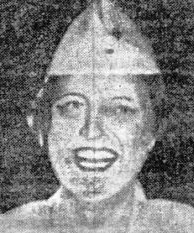 First Woman at Guadalcanal Now at 1347th
First Woman at Guadalcanal Now at 1347th
Island Battle Still Raged When Marie Ryan Went Ashore
1347 BU, India - There is a veteran at this base who volunteered for service in 1941, hit the beach at Guadalcanal before the din of battle had subsided, rotated back to the States, and then headed for CBI and a plastering by the Japs at a forward China base.
The veteran is Marie Coletta Ryan, American Red Cross girl.
Marie Ryan was the first woman on Guadalcanal, organizing morale-building facilities before the battles had ceased. Jap snipers haunted the ridges; "Washing machine Charlie" made nightly sorties; "Betty and Sally" still dropped their eggs in Nippon's attempt to regain the stronghold.
Same Old Skill
She toured New Caledonia, New Hebrides, Fijis, Solomons and New Zealand with Mrs. Roosevelt as ARC morale troubleshooter. Later, back in the States for a "rest," she plunged into the war campaign fund drive and made exhaustive radio appeals. She saw the drive to its conclusion, then headed for CBI.
Will Leave Soon
She played the CBI league with the same old skill and stamina and was in the middle of the plastering the Japs gave outlying China bases during the Christmas week "revenge" raids.
"It was just after Christmas Eve midnight mass," she said. "The Japs like to pick a time like that for their dirty work."
Impatient to be off again, she'll be departing 1347 BU soon to establish her eighth new Red Cross unit since arriving in the theater. Ticketed to "destination unknown" she hopes it will be up forward in the battle zone. Meanwhile she leaves activities here in the capable hands of Misses nancy Ryan and Erma Hopkins.
After the war she plans to take part in Red Cross rehabilitation work.
Gone With The Wind Just a Ghost Story to 1st Sergeant
1328 BU, Assam - If any black cats run in front of him, or there are any ladders under which he must pass to continue on his way, 1st Sgt. H. C. Roy of this base, will beat a hasty retreat, having urgent business in the opposite direction - but fast.
Prior to the big wind a few months ago, when his tent was blown down, he was not a believer in the supernatural. Since the latest "big blow," when his tent again was singled out for destruction, he has changed.
His tent is No. 13.
Short-Snorter Military Letter Transfer Result
Seventeen-Times-Indorsed Letter Carries Names of Big Shots
1328 BU, Assam - A short-snorter military letter has resulted from a request to transfer Pfc. Joe Orr from this base to the ETO in order to be near his twin brother, Dave.
The transfer? It came through in reverse - Dave was sent here instead, as reported in Hump Express, March 29.
"Ike" Eisenhower, "Tooey" Spaatz and "Killer" Kane are among the notable signatories to the 17-times indorsed letter which made the rounds for about four months. The generals, of course, were signed-in by proxy and only their typed names were added. The 18 actual signatures involved numbered five of a lieutenant colonel, four of a major, four of a captain, two of a first lieutenant, one of a second lieutenant, and one each of two warrant officers.
It all began last October, when Joe decided he and Dave had been separated too long. He went to the personnel office and initiated a request for his transfer to Europe.
Gen. Tunner Asks ICD Personnel to Support War Loan
Hq., Calcutta - A letter from Brig. Gen. Tunner to all members of the command calls upon every officer and enlisted man to support the seventh war loan program.
It was pointed out that the purchase of bonds would minimize inflationary threats as well as build up a "nest egg" for the individual soldier.
"It would be a source of real satisfaction to me to know that the division is a leader as an overseas installation in this seventh war loan," the general wrote. "It is, however, of eben greater significance to know that the individual is saving for his own future . . . I sincerely hope that every enlisted man and officer who can possibly do so will either initiate or increase a class B allotment or purchase a bond for cash."
Commercial Artists Building Air Room
1350 BU, Kunming - A new air room is under construction at wing headquarters here by a group of commercial artist on detached service from the 1345 BU India.
Many illustrations and diagrams will be featured, with a slide-panel plexiglass arrangement making for the greatest possible display space and clarity.
The artists are under the direction of M/Sgt. Leon Kane, 1300 BU, of Ft. Worth. They previously completed several air rooms at other key bases.
 The Prisoners Are Waiting
The Prisoners Are Waiting
As the time drew near for unconditional surrender of Germany, the most unforgettable thing was not the victorious drive of the Allied armies nor the crumbling of the German might, but the capturing of German prison and concentration camps.
What the Allied armies found - the unspeakable and unbelievable brutality, the sadistic mass slaughter and burying of American and Allied dead, the horrible conditions of those still living - overshadowed the certain victory which we have been awaiting.
These atrocities, which for brutish torture rival Atilla the Hun, whose ghoulish depravities time has never erased from German history, cast more light upon two things: what we have been fighting for in this war, and the kind of people we have been fighting.
That any nation in the twentieth century could have been capable of committing or even under the severest regimentation, of permitting such evil is shocking to the entire world and all of its peoples. The fact that the German criminals responsible no longer are alive or in power does not alter the consequences of their acts one whit! The nation which spawned these criminals stands responsible before the world for them.
The evidence of German atrocities will be bared to the world. Records are being kept, films and photographs are being made; investigating boards have been dispatched to prisons, concentration camps and stockades; and a delegation of 20 American editors, writers and publishers - men best fitted to tell the entire world the facts - is en route to Germany, as is a congressional committee empowered to obtain and report the truth to the American public.
The German atrocities must be made plain to the entire world, with no softening to spare human feelings. Further, the program of arganized brutality and regimented horror which was not only condoned, but nurtured and encouraged over a period of more than a decade, and which reaped its ghastly harvests in the Nazi prison camps, must be laid before the world for what it was - a planned, organized system of extermination and torture.
Of gravest import is what the shocking revelations in Germany may mean for the thousands of Americans
|
There are thousands of American prisoners in Japan's concentration camps. The conditions under which those still alive are living can be visualized from evidences of Japanese brutality of the past - the beheading of American pilots, the "death march" from Bataan, the atrocities in Manila.
We know now, beyond a shadow of a doubt, the kind of warfare Germany wages, behind her own lines, in the enclosures of her barbed-wire prison camps, against helpless prisoners of war. We know what kind of people we have been fighting in Germany. We know what kind of people we must continue to fight in Japan.
This knowledge gives the greatest urgency to the final drive against Japan. We not only give our every effort to crush Japan as speedily as we can to win the war, but also to liberate the thousands of Americans who are suffering and facing death every extra day - every hour they remain in Jap prison camps. The prisoners are waiting!
 Air Transport Creed
Air Transport Creed
I am the Air Transport.
Proudly I span the earth and sea to every corner - bearing medical supplies and personnel to the furthermost ends of civilization and to the front lines of battle - returning with the sick and wounded.
Day and night I drop my supplies, ammunition and paratroops where needed to grateful troops below, or land to rescue those in distress.
I am proud of my pilot and my crew - seeped in the traditions of the sea and air they jealously guard my cargo and the lives of my passengers with their very own, the last to leave the ship - trained to guide them back to safety on land or sea.
My every hour in the air is vigilantly watched and followed on the ground, my position known, my radio operator in constant contact with my command.
I am proud of my loyal ground crews that so devotedly inspect and maintain me an so quickly load and unload me, toiling day and night in the blistering sand blasts of the Sahara, the steaming jungles of India, the benumbing Arctic blasts of Iceland - that I may be constantly airborne on my mission.
I am proud of the industrious men and women in my factories whose hands so arduously made me and started me on my mission of war or mercy.
I am proud of the land that made me and gave me a chance to serve humanity.
I am proud of my command and proud of the flag I fly.
I am the Air Transport.
- Contributed by Col. J. E. Spier, 1300 BU

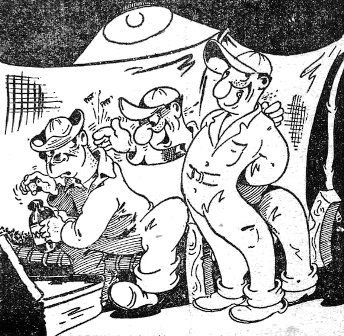 "Pal"
"Pal"
|
On Easter Sunday there were many of us who found a new experience. We took our chapel chorus out to sing for the people and also to attend their service. We received a most cordial reception.
This mission is the first place where I never heard the Indian welcome "baksheesh." For lack of space inside the church, the service was moved outside on the lawn where we visitors were provided with chairs while the rest of the congregation sat Indian-fashion on the carpets placed on the grass.
The congregation sang several hymns, but the only melody we recognized was that of the Doxology. The only words we understood were the words "Hallelujah" and "Amen." However, we were able to join the congregation in the Lord's Prayer which was prayed in our own language.
The pastor had known that we were coming and thoughtfully provided an interpreter for the sermon. The church and school are in charge of an Indian convert and five Indian teachers who also have embraced Christianity.
All who visited the mission that day came away deeply impressed with the work that was being done and the difficulties under which the missionairies labored. Now, when these men go back home "foreign missions" will mean much more to them than just so many words that were drummed into their Stateside ears once or twice a year.
They not only have seen the need of mission work and what it means to the people, but also the need of supporting the work in a financial way. They were impressed by the offerings of rice which some people brought, and it seemed as if most of them put some coin into the collection plate. It was undoubtedly the first time that any of us was able to place an offering for foreign missions directly into the hands of a foreign Christian.
At the suggestion of some men who felt they should be given the opportunity to contribute to some worthy cause as a part or regular chapel services, it was decided to support this mission. At the present time there is the move to complete the building of their chapel which was interrupted by the present war. Rupees are something which very few of these people have - particularly when they are counted in the thousands.
Our Protestant men already have contributed a considerable sum to this project and as soon as we can learn the approximate cost, we shall raise the money by volunteer contributions from our church-going soldiers. We then will take a picture of the chapel and give each man a print.
That will be a constant reminder to him of his present contribution to the cause of "foreign missions" while living in a strange land. I am sure that the increased interest in missions will stay with these men when they return to their homes.
- Chaplain B. H. Hoffmann, 1327 BU, Assam
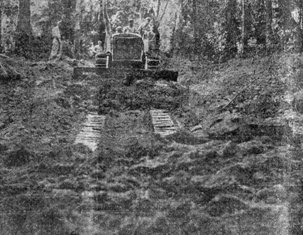 In the great forests of the Naga Hills, not far from 1330 BU, a road is built to the Army's own lumber camp, after
the decision has been made to avoid repetition of last year's calamitous lumber shortage by establishing a GI camp
rather than depending upon civilians. Primitive methods couldn't cope with growing needs.
In the great forests of the Naga Hills, not far from 1330 BU, a road is built to the Army's own lumber camp, after
the decision has been made to avoid repetition of last year's calamitous lumber shortage by establishing a GI camp
rather than depending upon civilians. Primitive methods couldn't cope with growing needs.
|
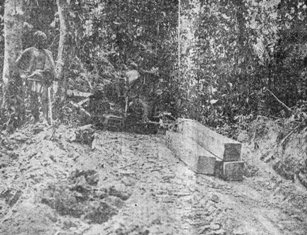 The caterpillar arrives and takes over the work of the elephants. A hillsman stands, amazed at the prodigious work
capacity of the machine. The tractor does many and varied jobs.
The caterpillar arrives and takes over the work of the elephants. A hillsman stands, amazed at the prodigious work
capacity of the machine. The tractor does many and varied jobs.
|
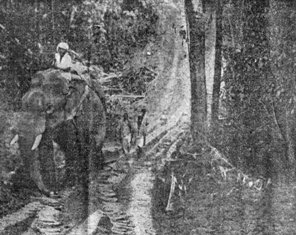 At first the Army relies on the immemorial elephant. Fifty cubic feet of lumber is his top daily capacity, a figure
which can be multiplied ten times by a caterpillar tractor. Immediate plans are made to replace him with caterpillars,
in order to supply the base with sufficient lumber before the monsoons end work.
At first the Army relies on the immemorial elephant. Fifty cubic feet of lumber is his top daily capacity, a figure
which can be multiplied ten times by a caterpillar tractor. Immediate plans are made to replace him with caterpillars,
in order to supply the base with sufficient lumber before the monsoons end work.
|
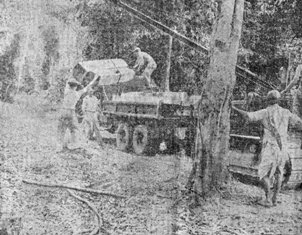 A tractor on which a crane is mounted lifts and stacks four time as much lumber as the elephant. Again the Nagas are
amazed and bewildered by the casual efficiency of the machines.
A tractor on which a crane is mounted lifts and stacks four time as much lumber as the elephant. Again the Nagas are
amazed and bewildered by the casual efficiency of the machines.
|
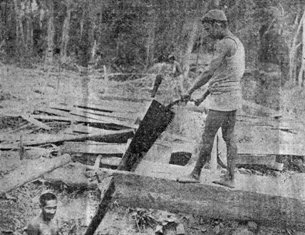 Primitive method of cutting wood: a trench is dug, then logs are placed across the width to serve as support for the
lumber that is being cut. When the saw reaches a brace, the log is moved forward.
Primitive method of cutting wood: a trench is dug, then logs are placed across the width to serve as support for the
lumber that is being cut. When the saw reaches a brace, the log is moved forward.
|
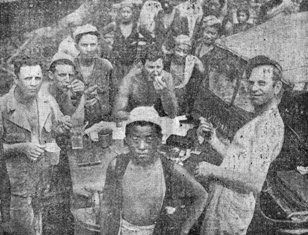 After a rugged morning in the woods, time out for dinner - C rations served on the hood of a jeep. GIs are Pfc. Denver
Broam, T/Sgt. Jack Roberts, Pvt. Leo Nowakowski, Pfc. Olson Irwin, Cpl. William Kavacic.
After a rugged morning in the woods, time out for dinner - C rations served on the hood of a jeep. GIs are Pfc. Denver
Broam, T/Sgt. Jack Roberts, Pvt. Leo Nowakowski, Pfc. Olson Irwin, Cpl. William Kavacic.
|
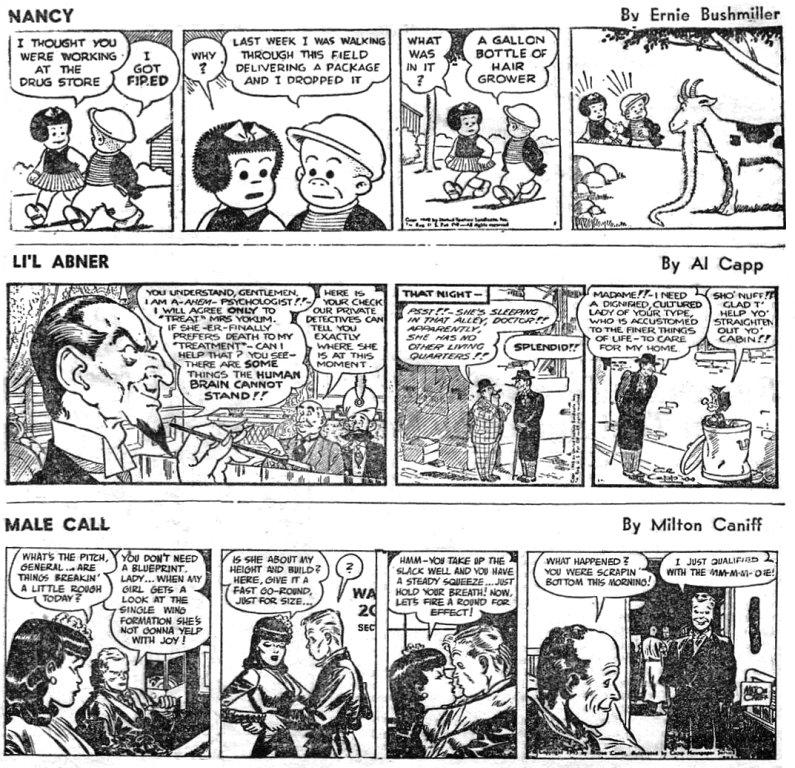
India Had Become a Highly Civilized Nation
6,000 Years Before Discovery of America
Town Planning Was Far in Advance of Western Methods
Editor's note: This is the second article in a "Know India" series by Prof. B. J. Viswani. It gives the American an insight into the historical background of India.
Young nations like the USA sometimes may be inclined to say, "The present is with us. Let the dead past bury its dead." But does the past really die?
It lives as much as our father and mother live in us all the time, just as our yesterday lives in our today - and in no country does the past live in the present as in India. Any intelligent study of the India of today, therefore, becomes unintelligible without a look back at its past. And this past is a long one.
What do you think man was like in Europe about 7,000 years ago? Was he not still in the stage of a caveman, with no knowledge and art of cultivation, clothing and home-building - a savage in skins?
Highly Civilized
What do you think man was like in India at that same time? On the banks of river Indus, he lived in towns which in general layout would have done credit to the town-planners of the 19th century, with roads and lanes on a geometrical pattern, with assembly halls, public baths, drainage system with manholes, private and public wells, care about light and air in individual homes, and generally advanced ideas in individual organization of life and municipal administration.
The people of India, even as early as 7,000 years ago had learned the arts of cultivation, spinning, weaving, painting and sculpture which developed in other countries some 3,000 years later. The beauty and polish of ornaments of those early Indians, exhibited in the archeological museums show a finish which even today may rival that of Bond Street jewelers.
Is that not wonderful? And is it not one of the silliest things in the world to paint India as the land of primitive barbarians who had never known civilization except in the last 200 years? Seven thousand years ago the people of India had also developed the industry of shipbuilding and the art of navigation and commerce which Europe developed about 5,000 later.
In Advance of Any
This is no romance, but hard incontrovertable fact which anybody can see for himself in the unearthed cities of Mohan Jo Daro in Sind and Harappa in the Punjab on the banks of the river Indus.
This early civilization, far in advance of any in the world, was enriched by the coming of Aryans in about 3,000 B.C., who gave to the world the Hindu religion, philosophy, sciences and arts which traveled to the West, and have gone to the making of much of the western civilization.
Arithmetic, algebra, geometry, astrology, calculus, and numerous other sciences flourished in India from age to age without a break, and though India had many invasions - Persians, Greeks, Huns, Scythians, Muslims - the civilized life in India was a long continuum.
Democratic Spirit
India conqueored its conquerors, absorbed them all in the end. It had grown like an overspreading banyan tree which sends down shoots to the ground, out of which rise new trees. It was so big that neither the horses of Greece nor the camels of Arabia were able to munch it out of existence.
While Greece, Rome, Babylon, Assyria, Egypt rose to great heights and are no longer in existence in their old glory, India has persisted through the ages.
When the Muslims came, in about 1,000 A.D., it looked as if this invasion was going to wipe out the old glories of India, but soon the invaders settled down as the sons of the soil, and out of this new stream of life rose the wonderful art of the Taj Mahal, the new religion of Sikhism and Sufism, a new language for India, and a new flowering of a democratic spirit on the ruins of caste system and some other evils of rigid Hinduism.
It is a long history and an article whic takes only 15 minutes to read hardly does it justice. This attempt to crowd the 7,000 years of India's past into 1,000 words is like a resurrection man unearthing a corpse and exhibiting just a skeleton and no more. Even as such, the linemants of India's glory are there for anyone who cares to read them - till we come to what we may call the British period of Indian history.
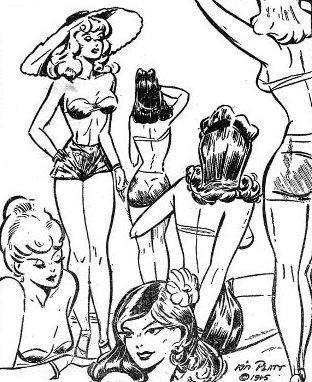 "We've been down here all summer - and what do we have to show for it?"
"We've been down here all summer - and what do we have to show for it?"
|
Now He Flies for ICD
1328 Sergeant Was Listed by Army as "Evadee" for 11 Months
1328 BU, Assam - Number one contestant for the oddest job title in the ICD is S/Sgt. Doug McClendon whose classification card lists his primary duty from October, 1943, until September, 1944, as "evadee."
A radio gunner aboard a B-17, he was shot down on the Schweinfurt raid. Bailing out over France, he was picked up by French underground.
A 20mm slug was removed from his leg and members of the underground took him by train to the Swiss frontier. McClendon and three of his crewmates were all listed as "evadees" during the 11 months which they spent in Berne, Switzerland.
Comparing his Army days in Europe and India, McClendon's only comment was, "The Hump's tougher than I thought it'd be."
Record Smashing C-54s Do It Again
1346 BU, India - Flying an average of nine and one-half hours each day for ten consecutive days, C-54s based here recently shattered existing records for cargo transported over the Hump during a similar period. Actual tonnage figures are censorable, but the supplies deposited on the other side of the "Rockpile" amount to millions of pounds.
HUMP EXPRESS is the official newspaper of the India-China Division, Air Transport Command, APO 192, c/o Postmaster, New York, N.Y., and is published by its Public Relations office. Camp Newspaper Service and Army Newspaper Service features are used, reproduction of which is prohibited without permission of CNS and ANS, 205 East 42nd St., New York, 17, N.Y. Other material is submitted by staff members, ICD-ATC base Public Relations sections and other soldier correspondents. Printed weekly by the Hindusthan Standard, 3 Burman St., Calcutta, India, and distributed each Thursday. Passed by U.S. Press Censor for mailing.
| Military transport schedules over India for cargo, personnel and mail . . . maximum tonnage of essential war materials over the Hump . . . movement of troops and supplies in support of tactical operations in China . . . evacuation of the sick and wounded - these are the missions of ICD-ATC. |

MAY 10, 1945
Original issue of HUMP EXPRESS shared by CBI veteran Grover P. Fike
Copyright © 2008 Carl Warren Weidenburner
SEE A PORTION OF THE ORIGINAL FRONT PAGE
TOP OF PAGE PRINT THIS PAGE ABOUT THIS PAGE E-MAIL YOUR COMMENTS
PREVIOUS ISSUE HUMP EXPRESS BASE NEXT ISSUE
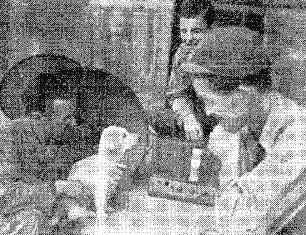 Even the Chinese pup strained an ear for the latest news over the radio at Kunming. Scenes like this were re-enacted
a dozen times daily as GIs on the Chinaside sweated out the official confirmation of German surrender. Left to right are
Pfc. Virgilio Correiro, Pfc. Lawrence R. Smith, and Pvt. Ernest W. Robson, of 1340.
Even the Chinese pup strained an ear for the latest news over the radio at Kunming. Scenes like this were re-enacted
a dozen times daily as GIs on the Chinaside sweated out the official confirmation of German surrender. Left to right are
Pfc. Virgilio Correiro, Pfc. Lawrence R. Smith, and Pvt. Ernest W. Robson, of 1340.
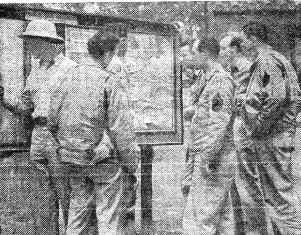
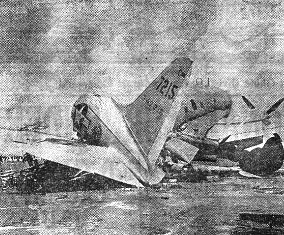 Miraculously, the pilot, Lt. Vern L. Flanders, walked out unscratched from this pile of debris, after his P-38
had smashed into the side of an ICD cargo plane. The C-46, its back broken, lies between the wreckage of the fighter
plane (right) and a cargo lift.
Miraculously, the pilot, Lt. Vern L. Flanders, walked out unscratched from this pile of debris, after his P-38
had smashed into the side of an ICD cargo plane. The C-46, its back broken, lies between the wreckage of the fighter
plane (right) and a cargo lift.
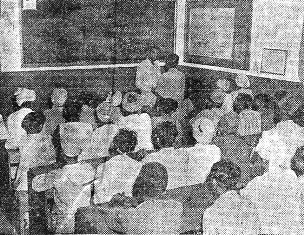 Karachi's Indian civilian employees will read and write basic English when they complete their streamlined schooling
in this class at the 1306 BU. Represented here are Moslems, Hindus and Sikh, youngsters and elderly men.
Karachi's Indian civilian employees will read and write basic English when they complete their streamlined schooling
in this class at the 1306 BU. Represented here are Moslems, Hindus and Sikh, youngsters and elderly men.
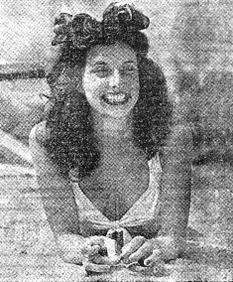 Shake hands with Pann Merriman, of USO's "Happy Holiday," currently touring in the Valley. Lucky photographer
Jack Gibb caught up with her one hot Assam afternoon at the 1333 BU swimming pool. Was that a wolf-howl we just heard?
Shake hands with Pann Merriman, of USO's "Happy Holiday," currently touring in the Valley. Lucky photographer
Jack Gibb caught up with her one hot Assam afternoon at the 1333 BU swimming pool. Was that a wolf-howl we just heard?
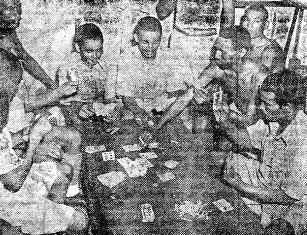 During their off-duty time, Gurkha soldiers behave like GIs - they play poker. Of course, their brand of poker is
a little different from the American type, but it costs rupees to learn the game. They call it "sydal."
During their off-duty time, Gurkha soldiers behave like GIs - they play poker. Of course, their brand of poker is
a little different from the American type, but it costs rupees to learn the game. They call it "sydal."
